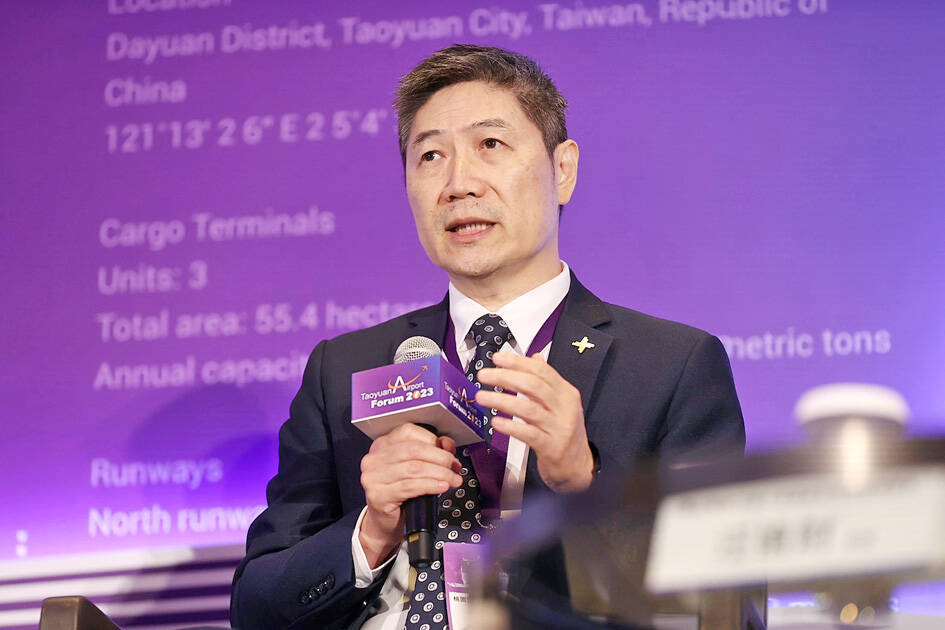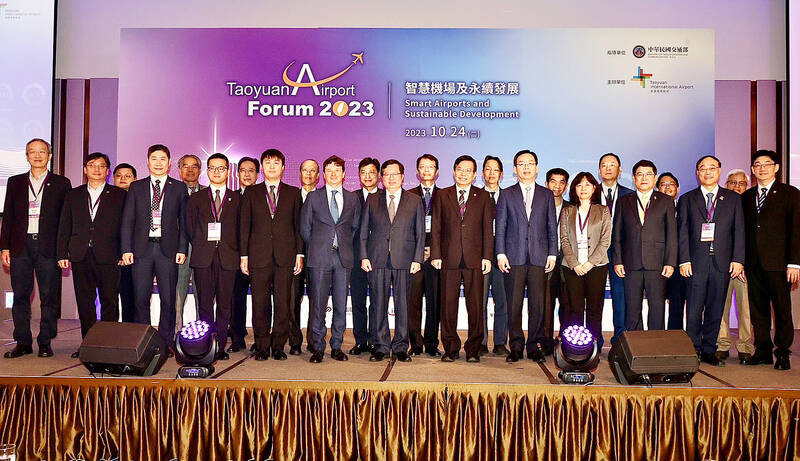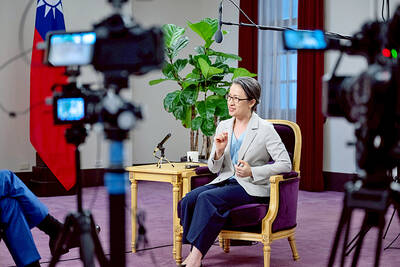Taoyuan International Airport Corp (TIAC) should speed up its recruitment and cultivation of talent and quickly expand the capacity of Taiwan Taoyuan International Airport’s ground transit system to meet increasing service demand brought by an expected increase in passenger numbers in the next few years, aviation experts said on Tuesday at a forum organized by the airport operator.
The experts called for immediate action after the state-run company projected that the number of passengers accessing Taoyuan airport this year could exceed 30 million by the end of next month. That would be about 70 percent of the number recorded in 2019.
The Ministry of Transportation and Communications said that the airport’s service capacity would expand from 37 million passengers per year to 82 million after its third terminal and third runway are competed in 2026 and 2030 respectively.

Photo courtesy of Taoyuan International Airport Corp
While the Taoyuan Airport Forum focused on the use of smart technology and sustainable development at the airport, it also addressed challenges and opportunities for a future airport, as well as issues arising from innovative passenger services.
Civil Aviation Administration Director-General Lin Kuo-shian (林國顯) said that the number of passengers accessing Taoyuan airport plunged from 48.69 million in 2019 to 5.34 million in 2020, 908,000 in 2021 and 7.3 million last year.
“This year, we should be coming out of a curve to reach 30 million,” Lin said.

Photo courtesy of Taoyuan International Airport Corp
Wong Jinn-tsai (汪進財), a transportation and logistics professor at National Yang Ming Chiao Tung University, said that TIAC should ensure that Taoyuan airport’s ground transit system has capacity for 82 million passengers.
“During peak hours, you cannot even find a seat on the Taoyuan airport MRT line. Instead of asking everybody to drive, which is not a sustainable move, the airport company should consider working with carpooling service providers,” Wong said.
Chunghwa Airport Council chairman Yin Cheng-pong (尹承蓬) said that TIAC has 600 employees, only half the number in some benchmark airports.
However, the company’s employees are expected to have the same workload as those at benchmark airports, Yin said.
To meet future challenges, the airport should organize exchanges with other hub airports in Asia and use resources from Airports Council International to train its employees, Yin said.
Taoyuan International Airport Corp CEO Fan Hsiao-lun (范孝倫) said that the company must address the issues of sustainability and green energy as they are irreversible trends.
The company has experimented with the use of self-driving cars at the airport, but increasing the use of sustainable aviation fuel needs cross-departmental cooperation, Fan said.
“We pay NT$50 million [US$1.55 million] per month for the electricity used in Terminals 1 and 2, so we have to start thinking about solar energy and other options for green power... People are worried that the flares caused by solar panels could affect aviation safety, but the problem can be solved with the advancement of modern technology,” he said.
Chaoyang University of Technology associate professor Lu Yen-liang (盧衍良) said airlines managed to survive during the COVID-19 pandemic because of their booming air cargo businesses.
However, unlike passenger servics, airlines are not required to pay Taoyuan airport a cargo service charge, Lu said.
Given that the company has listed a series of initiatives to make Taoyuan airport a smart and sustainable airport, it needs to reconsider the tariffs it charges airlines and whether they would cover funding for the initiatives, Lu said.
Lu also urged TIAC to offer services that would attract more air travelers to transfer in Taiwan.
(Taoyuan International Airport special report)

China might accelerate its strategic actions toward Taiwan, the South China Sea and across the first island chain, after the US officially entered a military conflict with Iran, as Beijing would perceive Washington as incapable of fighting a two-front war, a military expert said yesterday. The US’ ongoing conflict with Iran is not merely an act of retaliation or a “delaying tactic,” but a strategic military campaign aimed at dismantling Tehran’s nuclear capabilities and reshaping the regional order in the Middle East, said National Defense University distinguished adjunct lecturer Holmes Liao (廖宏祥), former McDonnell Douglas Aerospace representative in Taiwan. If

TO BE APPEALED: The environment ministry said coal reduction goals had to be reached within two months, which was against the principle of legitimate expectation The Taipei High Administrative Court on Thursday ruled in favor of the Taichung Environmental Protection Bureau in its administrative litigation against the Ministry of Environment for the rescission of a NT$18 million fine (US$609,570) imposed by the bureau on the Taichung Power Plant in 2019 for alleged excess coal power generation. The bureau in November 2019 revised what it said was a “slip of the pen” in the text of the operating permit granted to the plant — which is run by Taiwan Power Co (Taipower) — in October 2017. The permit originally read: “reduce coal use by 40 percent from Jan.

‘SPEY’ REACTION: Beijing said its Eastern Theater Command ‘organized troops to monitor and guard the entire process’ of a Taiwan Strait transit China sent 74 warplanes toward Taiwan between late Thursday and early yesterday, 61 of which crossed the median line in the Taiwan Strait. It was not clear why so many planes were scrambled, said the Ministry of National Defense, which tabulated the flights. The aircraft were sent in two separate tranches, the ministry said. The Ministry of Foreign Affairs on Thursday “confirmed and welcomed” a transit by the British Royal Navy’s HMS Spey, a River-class offshore patrol vessel, through the Taiwan Strait a day earlier. The ship’s transit “once again [reaffirmed the Strait’s] status as international waters,” the foreign ministry said. “Such transits by

Taiwan is doing everything it can to prevent a military conflict with China, including building up asymmetric defense capabilities and fortifying public resilience, Vice President Hsiao Bi-khim (蕭美琴) said in a recent interview. “Everything we are doing is to prevent a conflict from happening, whether it is 2027 or before that or beyond that,” Hsiao told American podcaster Shawn Ryan of the Shawn Ryan Show. She was referring to a timeline cited by several US military and intelligence officials, who said Chinese President Xi Jinping (習近平) had instructed the Chinese People’s Liberation Army to be ready to take military action against Taiwan